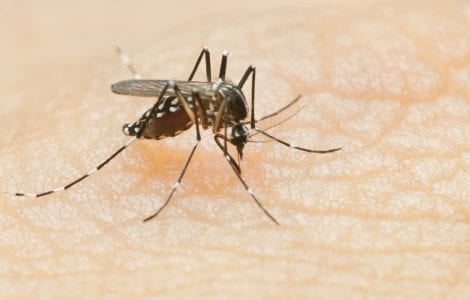Mosquitoes, ticks carry diseases that can harm pets

While humans certainly suffer from swatting pesky mosquitoes away during this time of year, pets can get quite ill and even die from disease spread by the insect.
Heartworm is spread by mosquitoes, making it especially dangerous in warm, humid climates such as Southwest Florida. Once infected, a pet can suffer from severe lung disease, heart failure, organ damage, and in some cases, death. Dogs are natural hosts for heartworms, but cats are also at risk — even indoor cats.
“The more mosquitoes there are, the greater the chance of your animals getting bit by one that caries the deadly virus, dirofilarial immitis, which causes heartworm disease in dogs,” said Cape Coral Animal Shelter Executive Director Liz McCauley.
As summer reaches its peak, so does the risk of pets contracting heartworm disease.
Prevention is key.
Experts suggest speaking to a veterinarian about monthly preventative medication, as it’s safer, easier, and far less expensive than treating an infected animal.
“It is imperative that dogs and cats, too, are on monthly heartworm preventative which can only be purchased from your veterinarian,” McCauley said. ” A heartworm test is required yearly to make sure a dog or cat has not contracted heartworm prior to receiving the preventative. There are several options — from monthly chewable tablets to an injection that lasts an entire year. The best option for your pet can be discussed with your veterinarian. Cape Coral Animal Shelter has a low-cost veterinary clinic open to the pubic and we will be happy to discuss your pet’s needs.”
Signs of heartworm in dogs include coughing, fatigue, reduced appetite, and weight loss. In cats, symptoms may be subtle or include vomiting, respiratory distress, or sudden collapse. Testing and early treatment are critical. Heartworm damage can begin long before your pet shows signs of illness.
“If not treated, dogs will eventually die from heartworm — a painful death,” McCauley said. ” The worms obstruct blood flow in the heart and cause inflammation and scarring in lung tissues. The infection, along with the breakdown products from the worms can cause kidney and liver damage.”
The increase in cases correlating with the summer months where mosquitoes are more prevalent is something the shelter has seen since its inception.
“Since we opened in 2020, we have treated over 240 dogs of our adopted dogs for heartworm disease, which has cost us well over $100,000,” McCauley aid. “We seemed to have a ‘reprieve’ over last winter, but just in the last two weeks, three heartworm positive dogs came into our shelter. Since it takes a while for heartworm to be detected, our concern is that in a few months we will see an increase in cases because of all the mosquitoes around now.”
Ticks
Along with mosquitoes carrying disease, ticks can also cause irritation, transmit diseases, and even lead to paralysis for pets in some cases.
In terms of tick activity, Florida ranks No. 2, according to Termineix, a Rentokil Terminix company, which announced its first-ever comprehensive ranking of the Top 25 Most Tick-Infested U.S. States this week.
Florida comes in behind only California, which top the list due to its warm climates, high humidity and abundance of green spaces.
“This isn’t just a nuisance; tick activity is reaching new levels across the country, posing a serious and growing public health threat,” said Tom Dobrinska, technical service manager at Terminix, in a release “Climate change continues to increase tick populations. As winters become milder and warm seasons increase in length, tick survival and risk for human exposure increase significantly.”
Its rankings are based on proprietary 2024 pest management data which reveals which states face the greatest tick pressure and risk of tick-borne illnesses, officials said,
To protect against tick bites and tick-borne illness, Terminix recommends the following steps:
• Avoid tick-infested areas: Ticks prefer wooded areas with high grass and abundant leaf litter; wear long sleeves and pants whenever you plan to go on a hike or walk through forested areas.
• Inspect yourself and pets: After returning home from being outdoors, conduct a full body check, especially under the arms, around the ears and on the back of the knees. Finding them before they bite will help prevent being infected with any diseases they may be carrying.
• If you find a tick bite: Using fine-tipped tweezers, grasp the tick as close to the skin as possible and pull upward with steady, even pressure. After removal, clean the area with soap and water or rubbing alcohol, and dispose of the tick by flushing or sealing it in tape. It’s also best to consult with a medical provider for extra precaution.
“Scientists and public health experts are constantly researching ticks to better understand the threats they pose,” said Dobrinska in the release. “As these experts continue to monitor tick activity and disease spread, it is essential for the public to stay informed about the dangers and know how to prevent tick bites.”
To reach CJ HADDAD, please email cjhaddad@breezenewspapers.com

